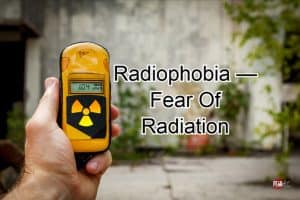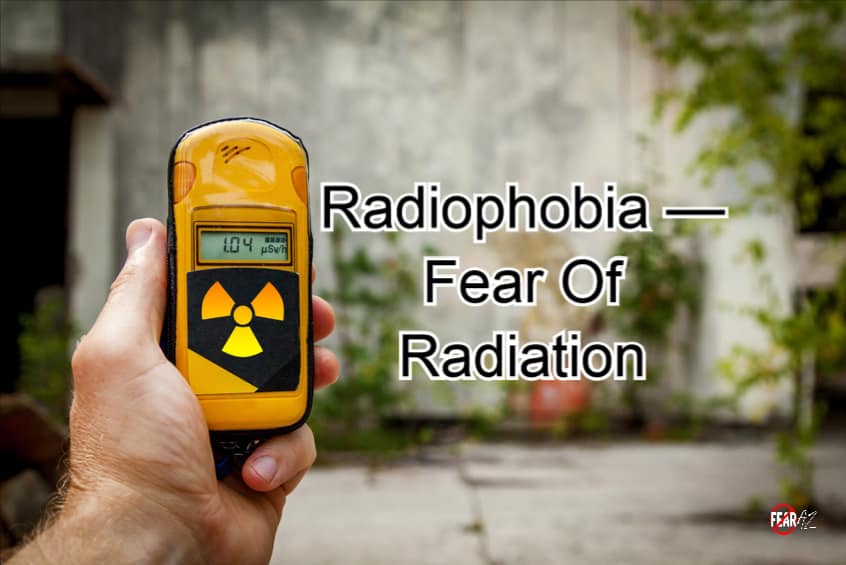Share This Article
Radiophobia: Rare but Real
Of all the irrational fears you’ll come across, radiophobia is one of the most rare, yet most fearful. Who knew that not just radiation, but the fear of radiation could be detrimental to our health?
Do you get shivers at the mere mention of terms like radiation, nuclear reactions, and ions? If so, you may be suffering from radiophobia.
Radiophobia can cause a lot of mental and physical distress to the body. Nevertheless, this phobia is treatable.
To learn more about this irrational fear, the causes of radiophobia, and treatment options, read on.
Some Things You Should Know about Radiophobia
Have you had a friend refuse to get X-rays simply because they believed the radiation would kill them? They most likely suffer from an exaggerated, inexplicable, yet genuine fear of radiation, also called radiophobia.
The sight or mention of nuclear reactions and the application of radiation in different fields can induce panic and anxiety in those who struggle with this fear.
The term “radiophobia” is a blend of two words: radio, which can be associated with radioactivity or radiations, and phobia, which means an extreme reaction or fear of an object.

Radiophobia Origin and Causes
What causes radiophobia?
Radiophobia can originate from events that happened in the past.
You may have been affected by the bombings at Hiroshima and Nagasaki, both which involved the usage of nuclear weapons. Or you may have first developed the fear when you heard about the nuclear disaster that took place in Russia’s Chernobyl Nuclear Power Plant.
In the modern world, learning about such traumatic events involving radioactivity may cause a person to develop radiophobia.
Other generic radiophobia causes may include:
- Family history and genetics
- Environmental factors
- Past trauma that makes a person more vulnerable to developing a phobia
What Is Radiophobia Like?
Radiophobia might seem like a rational fear, considering radiation is dangerous, life-threatening, and something everyone is fearful of. However, for someone who suffers from the phobia of ionizing reactions, such a phobia can disrupt their everyday life.
The thought of radioactive reactions might frequently make an appearance in the sufferer’s mind. It may instill negative emotions and impede their routine activities.
Even if the actual ionizing reactions do not seem to possess a threat of great magnitude, the fear of such reactions can do more harm than the reactions themselves.
Radiophobia Symptoms
The reactions or symptoms of radiophobia are usually in proportion to the quantity or the severity of radioactivity or radiation-related events one encounters.
Psychological Symptoms
- Lack of concentration
- Loss of focus
- Inability to relax or stay calm
- Severe anxiety, panic attacks, and stress
Physical Symptoms
- Dizziness
- Palpitations
- Fatigue
- Feeling of nausea
- Loss of breath
- Severe headaches and migraines
- Dry mouth
How Do You Deal with Radiophobia?
The first step to dealing with radiophobia, as with any other phobia, is to first accept and acknowledge your fears. The quicker you recognize your phobia, the faster you learn to cope with your fear, and the easier it will be for you to overcome it.
Your symptoms may reduce over time, and you may grow to feel normal about radiation, nuclear activities, and radiophobia.
Try to expose yourself to your fears as much as possible. Familiarize your brain with the objects you associate with radiophobia.
To ensure that every treatment or method that you use to fight against your fears has effective outcomes, pair it up with self-love and self-care. Be kind to yourself; lead a physically and mentally healthy life.
Radiophobia Treatment
Seeking help from a professional is one effective form of treatment. It will also offer long-lasting solutions and practical outcomes. When you visit a therapist, they may try different treatment methods based on the severity of your phobia. Listed below are a few treatment options that your therapist may use to treat radiophobia.
Exposure Therapy
During exposure therapy, the therapist exposes the patient to the source of their fears for a specific period of time. This helps desensitize the patients to the source of their fear. The therapist may initiate conversations about radiation with the patient, so they get used to hearing and talking about it.
Cognitive Behavioral Therapy
In cognitive behavioral therapy, the patient learns about different tools to help cope with the anxiety their fears induce. This therapy helps identify the patient’s thought and behavior patterns around the fear. It attempts to modify these patterns to weaken the fear and anxiety around it.
The patient can also join general counseling forums where they gain a platform to openly discuss their feelings and emotions. The counselor may provide constructive feedback to help them deal with their fear.
How to Cope with Radiophobia
Coping with radiophobia involves consistency and commitment. You need to plan a schedule, work out efficient ways that will help you cope with the fear, and then execute them daily.
Here are a few tips you can follow to help you effectively cope with your fears:
- Make a journal and list all your objects of fear. Create a list of everything that brings about a high level of anxiety and panic. Once you identify all the phobia factors that cause you distress and understand the behavioral changes and patterns you experience, you will be able to better cope with your fears.
- Invest time in productive activities to distract yourself from negative thoughts and negative emotions. You can start a hobby, read a book, socialize with friends, cook meals, or learn new skills.
- Practice breathing exercises to reduce anxiety, which is the most common and severe result of phobia. Any time you feel yourself losing control over your feelings, overcome it by using relaxation breathing techniques.
- Join groups where people share the same concerns as you. It’s important that you feel you can communicate your feelings and thoughts without fear of judgment.
- Practice yoga and mediation for your mental well-being. Make sure to include some form of exercise in your routine for your physical wellness.
Some Final Words
If we have to pick one single, effective method that works best in eliminating fear, it has to be facing and becoming familiar with the fear. If you choose to run or hide from your fears, your fight will only get tougher, and you’ll have a hard time dealing with anxiety-inducing objects.
Make sure to learn as much as you can about your fears. And if you know someone going through similar trouble dealing with radiophobia, share your concerns and what you’ve learned with them. By helping others, you help yourself.




